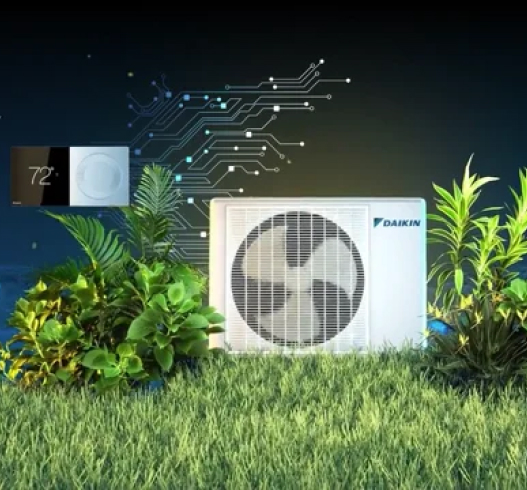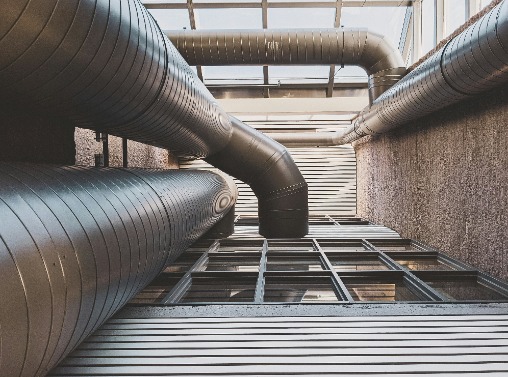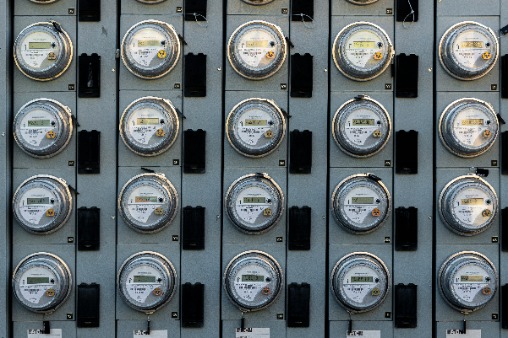How to Determine If a Heat Pump Is Right for You

Wondering if a heat pump is a right choice for your home? Here we look at the pros and cons of installing this energy-efficient heating system.
Are you considering installing a heat pump for home heating and cooling? If so, you're likely weighing the benefits and drawbacks of doing so. Here, we'll look at some of the pros and cons of having a heat pump to help you make an informed decision.
What is a Heat Pump?
A heat pump is an energy-saving home heating and cooling technology that transfers heat from one place to another to keep your indoor space comfortable. Despite being called a “heat” pump, it can actually be used for both heating and cooling. Heat pumps are an efficient way to achieve comfort in your home, by moving heat where it needs to be to make you comfortable. In the winter, that means moving heat from the outside indoors, and in the summer, it means moving heat from inside your home, outside where it belongs. Heat pumps work using electricity, not by burning gas.
Did you know? Your refrigerator uses the refrigeration cycle to produces the cold air inside it to maintain your fresh produce. To do this, the heat extracted from inside the refrigerator is transported outside through a heat exchanger on the back. If you have ever placed your hand behind an operating refrigerator, you are likely to sense the heat extracted. A heat pump can reverse the refrigeration cycle to produce heat inside your home, in the same fashion a straight air conditioner can remove heat.
A well-known alternative to central fuel systems, heat pump solutions reduce local CO2 emissions by using electricity to heat (and cool) your home. So not only are you getting a heating system that does not emit CO2 locally, but you are also getting cooling in summer. Just think of a heat pump as a heat transporter, extracting warm air from your home during the summer, and reversing operation to bring warm air in during the winter, through the efficient refrigeration cycle.
Types of Heat Pumps
There are three common types of heat pumps: ducted, ductless, and geothermal. Each type has its unique benefits. Let's take a closer look at each type.
Ducted Heat Pumps
In a ducted system, the heat pump is the outside component of a split system. It is typically paired with an indoor heat exchanger that is often located in an attic, interior closet, or the garage. The two pieces of equipment are connected by a closed circuit of pipes containing refrigerant. Inside the home, the heat exchanger is connected to ductwork that distributes heated or cooled air into your various spaces.
Ductless Heat Pumps
Ductless (commonly referred to as mini-split) heat pump systems are becoming increasingly popular for both home and business owners who are looking for efficient and effective heating and cooling solutions. These systems do not require interior ducting, as they are designed to be used with an outdoor unit connected to one or more indoor units. Rather than the traditional ducted systems that feed air into a space through a series of vents, ductless systems are installed in the space they are meant to heat or cool.
These systems are usually very flexible in their application and installation, where indoor units come in many different styles to adapt to each home. Each unit is mounted on the wall or recessed in the ceiling to serve a single space. Multiple indoor ductless units can be connected to a single outdoor unit.
Geothermal Heat Pumps
A geothermal heat pump relies on the earth's natural thermal energy for heating and cooling. This type of heat pump can be used in both residential and commercial settings. These systems will use the temperature of the earth's surface to heat or cool a building.
Air Conditioning
The AC in HVAC stands for air conditioning and is typically comprised of outdoor and indoor equipment. On the outside, the equipment contains a condenser coil, compressor, and a fan. Inside the home includes an evaporator coil and blower. In a package unit, these components are in a single outdoor cabinet.
AC systems are either ducted or ductless, and vary In capacity and efficiencies. Make sure to contact your Daikin Pro to review what system Is right for your home.
Heat Pump Benefits
Energy Efficient
One of the biggest benefits of a heat pump is its energy-efficiency because it does not create heat – it moves it. A heat pump captures heat from the outside air, even in cold weather, through the refrigeration cycle, and moves it into your home. It uses the energy from the fluid refrigerant (R410A or R32) during Its transformation from liquid to gas phases to amplify the heat captured, warming up the home efficiently. This means less energy may be required to operate a heat pump than other types of traditional heating and cooling systems. In the summer, a heat pump reverses the cycle to help absorb heat from the inside and release it outside. It works similarly in the winter, absorbing heat from the outdoors and releasing it indoors.
Save Energy
Heat pumps are generally considered an environmentally friendlier option, when compared to traditional gas or oil heating equipment. Heat pumps may use three to four times less energy than traditional gas appliances, which can help to reduce your carbon footprint and save you money on your energy bill. And, because they don't burn fossil fuels, they don't directly release emissions into the atmosphere at a local level.
Indoor Air Quality
Whether ducted or ductless, heat pump traditionally filters air continuously when in operation. This is a significant advantage compared to electric heat baseboards or radiators. Many systems can Integrate with high efficiency filters, ventilation units, or UV air treatment systems that prevents the growth and circulation of contaminants within your home. In addition, it may be helpful to consider room air purifiers to complement your system's Indoor air quality performance.
Smart Control
Today’s heat pumps have evolved to connect with smart devices that can provide an intelligent schedule function, WIFI connectivity and remote operation, or even monitor your Indoor air quality. Setting schedules with set points lowered (In winter) and higher (In summer) when not home Is Important and can result in significant savings. Traditional, old generation thermostats may be inaccurate in their temperature control, and a smart device allows for accurate control. Some controls also offer data services that connect with your dealer, so your system maintains consistent, optimal, operation.
Heat Pump Considerations
Upfront Cost
One drawback of heat pumps, or any heating and cooling system, is the initial investment. The cost of a heat pump may be as low as $6,000 or scale to over $15,000 depending on your home’s design, locations, required specifications, energy-efficiency rating of the unit, necessary additional parts, and installation requirements. This initial cost is roughly similar to other heating equipment Installation cost. It is important to remember that heat pumps are a long-term investment in your home and comfort, and their energy-efficient design is engineered to help save you money in the long run. Financing is available to help spread the Initial Investment through time. Make sure to discuss your options with your installing company that will provide the systems' assessment and recommendation.
Incentives
Heat pump installations may qualify for an unprecedented incentive package to support converting homes to all-electric, high-efficiency solutions. Be sure to learn more about the Inflation Reduction Act and its incentives for homeowners. Once states apply for funds and set up their programs, eligible homeowners and other qualifying individuals (with Income qualification requirements) can begin to qualify for rebates up to $8,000 for all-electric ENERGY STAR heat pumps.
Electricity Costs
Because heat pumps run on electricity, your electric bill may increase after installation if you’ve switched over from a gas or oil furnace. However, the overall cost of running a heat pump is typically lower than other systems, saving you money in the long run. The operation cost difference Is tied to the fuel costs in your region; compare electricity, gas, or oil rates in your area to make the best decision that suits your needs.
Common Questions About Heat Pumps:
Can a heat pump heat a whole house?
Yes, a heat pump system, both ducted and ductless, can be designed to heat and cool your entire home.
Are heat pumps effective in cold weather?
A heat pump is designed to meet a specific capacity to heat a home in cold weather. While old models may struggle when the outdoor temperatures drop below freezing, certain modern heat pumps with inverter technology are specifically designed for extreme cold. For example, the Daikin AURORA ductless heat pump with inverter technology is designed to operate efficiently in temperatures as low as -13°F.
How is a heat pump different from an HVAC?
A heat pump is an HVAC (heating, ventilation, and air conditioning) system. A heat pump heats, cools, filters, and in some cases purifies the air in your home, while maintaining humidity at an optimal level when sized correctly.
Doing More with Less
A heat pump transfers heat in the air with refrigerants to control indoor temperature. In heating operation, the outdoor unit absorbs heat from outside air and transfers it to the indoor space. In cooling operation, the indoor unit absorbs heat from indoor air and rejects the heat to outdoor.
Heat pumps eliminate the need to produce heat using standard combustion methods, therefore reducing direct CO2 emissions associated to the cooling and heating system.
All Daikin ductless systems heat using heat pump technology, while central air systems are available in both heat pump or gas furnace. Daikin Fit systems allow for dual fuel capability, switching from heat pump to gas furnace heating only when necessary.
In this article
Connect on Social Media
 Follow on Facebook
Follow on Facebook
 Follow on YouTube
Follow on YouTube
 Follow on Instagram
Follow on Instagram
 Follow on X
Follow on X
 Follow on TikTok
Follow on TikTok
 Follow on Pinterest
Follow on Pinterest

Looking for help now?
Enter your zip code to search for Daikin Contractors in your area.
Learn More
Learning Center Content
Stay informed about home comfort technology, when to upgrade, energy efficiency, and reducing your energy bills.





























